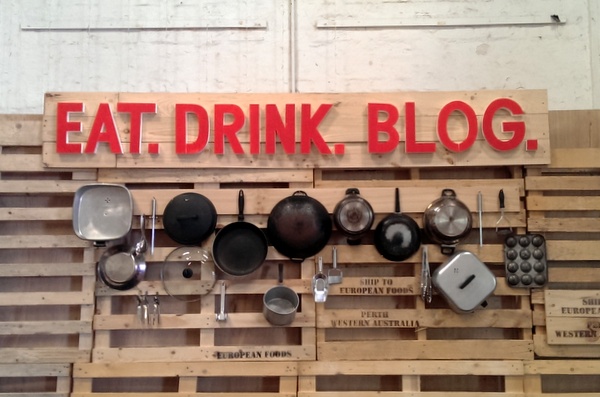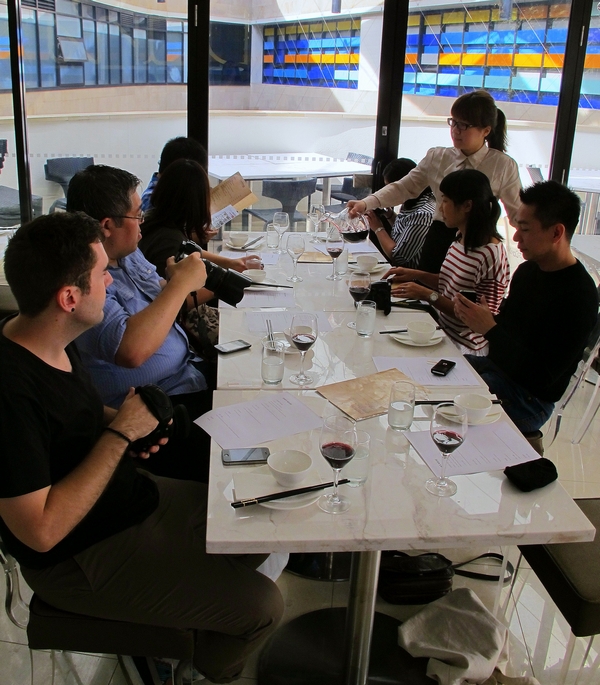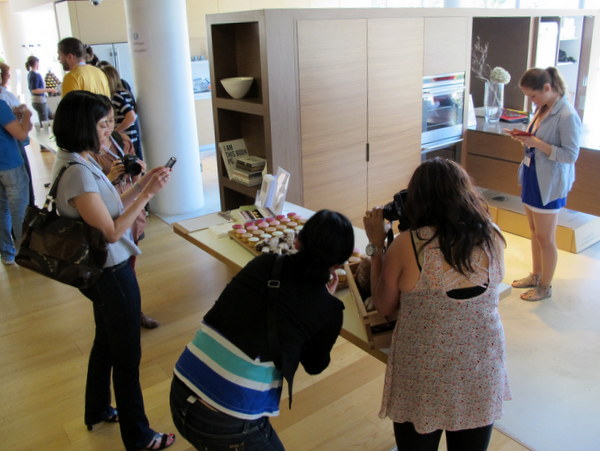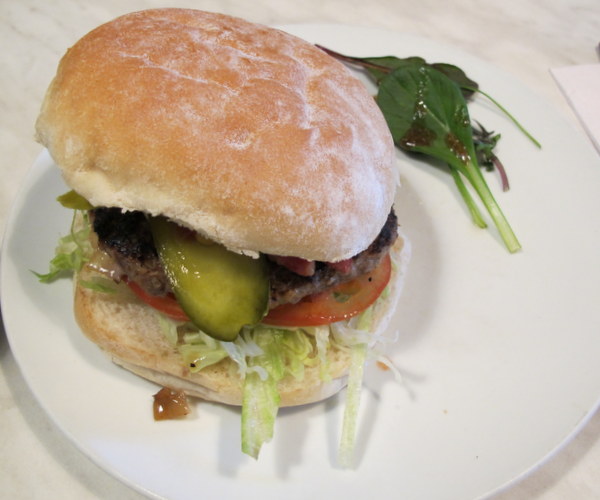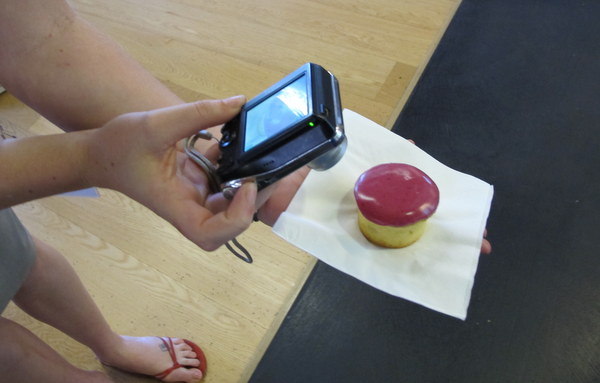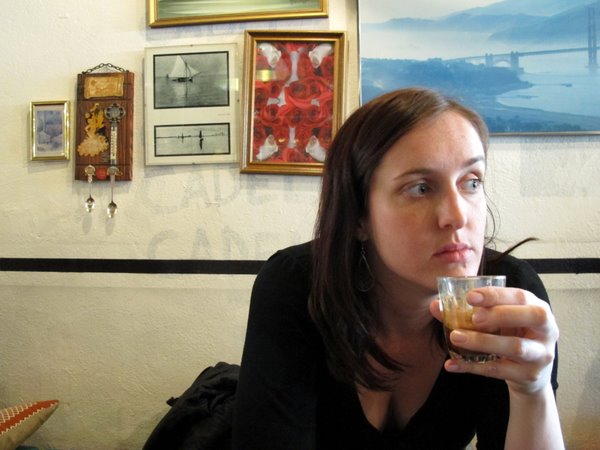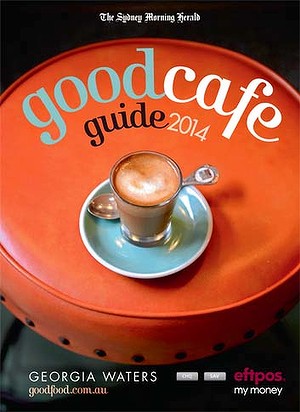I was tagged in this blog hop by an always excellent blogger and very good chum of mine, Tara of VegeTARAian. You can read her post over here.
Why do I feel the need to sit down every week or so and tell perfect strangers about the latest place I went to sip on an excellent coffee? Why does any of it matter, if there are 70,000 food blogs and who knows how many food-based instagram accounts out there? What is my blog adding to ‘the conversation’?
These are questions I’ve been struggling with and procrastinating over for the last 6 months or so.
What am I working on?
The long answer: Right now, I’m ‘working on’ what I want my blog to be. Corridor Kitchen’s been running for almost four years and I’ve realised quite recently that the ‘template’ or ‘format’ I developed to keep the posts manageable and my motivation high has become needlessly restrictive; it’s actually started to de-motivate me.
I’d like to delve deeper into the topics I want to know more about. Enough of this surface-level soundbite bullshit. Unless, on a particular day, I feel like writing some surface-level soundbite bullshit! It’s my blog, I can write about what I like, isn’t that the point!? I’ve also become ridiculously hard on myself. If I’m not at the hot new coffee joint the second it opens to give people the 411, I often just let the post go altogether.
Chasing decent traffic and heeding far too much advice about staying ‘true to brand’ or ‘on topic’ can sometimes leave me frozen, unable to write a thing. Never mind that fact that anything I write on my blog will be, by definition, ‘true to brand’ because I wrote it. So I’ve resolved my blog, my rules. Fuck what everyone else is writing about if I’m not interested.
The short answer: Whatever the hell I like.
How does my writing differ from others in its genre?
It doesn’t, because there’s a very established format for food blogs. Most food blogs either fit neatly into or include some combination of the four archetypes below:
- The ‘reviewers’, those who write about the places in their area or a specific food type (e.g. they might write about specialty coffee worldwide, or they might write about New York restaurants). These blogs often have a hip, sometimes flippant tone and a finger-on-the-pulse bent and they are incredibly useful when you’re looking for a great restaurant or café somewhere.
- The recipe developers, who create or adapt recipes and sprinkle in a lovely little personal story into each post (I learnt this formula early on, it is what drew me to food blogging). The great thing about these blogs is they are very universal and relatable; their sense of place does not rely on you knowing a ‘scene’ or context’.
- The aggregators or ‘food mag’-style websites – those that aim to cover everything they can relating to food and may have many contributors. These can be amazing for the breadth of information they cover, their reach.
- The originals, who are truly doing something different, refuse to fit into or be part of any of these genres
Ok, ok, my writing does differ, because I have my own voice. But so does everyone else.
Why do I write what I do
I came to start the blog because fear of death.
I have always written; journals, in my free time, all through school from the time I could write until I graduated from uni. I do well in instances where people set me a task and give me a grade. The blog was in itself a writing ‘assignment’ I set myself (write a blog, you’ve got nothing else on kid), because I had an epiphany and realised I can set my own damn work.
I write a food blog because food is easy to write about, we all eat, we all have an opinion about what we stuff in our gobs.
I write about coffee because that I am obsessed with it and I think I know what a good one is, how to make it and where to find it. And I don’t see any reason why that information should not be shared, for free, unsponsored and as free of influence as can be, for anyone who wants it.
I reckon there are shitter writers than me out there writing about the same topics and I refuse to give the entire online space over to them.
How does my writing process work
Of late, it doesn’t work so well. But I’m starting to free myself up.
I take notes on my phone or a notebook when I have an idea or want to remember a phrase. I will sit down and force myself to bang out an entire post in a couple of hours. I will leave that for at least 24 hours and then check back and revise. I’m too lazy to do that a second time, so I’ll often leave the writing at that.
Sharing the love
Ok, now for the good bit. Four excellent bloggers below have agreed to be tagged in this hop by yours truly. I’d put more faith in their wisdom than mine if I were you.
Enviro-warrior, Tasmanian, Travel nut, stellar photographer (seriously) and good mate, Toni over at Shape of Things to Come seriously gives a fuck about sustainability and lives that principle. She’s in Peru right now putting her money where her mouth is.
Simon from The Heart of Food is one of the first Aussie bloggers I really started reading and got to know in person. He is a meticulous perfectionist, consummate photographer and all-round nice guy who’d surely give you his last panna cotta lamington if you asked. His posts are rare but precious things.
Ed has been blogging at Tomato since 2005 on food, writing, journalism, pr, ethics, you name it. His blog makes for a cracking read and that’s no surprise as he’s an ex-journo, social media consultant and self-described ‘punk rock food warrior’.
And Ai-ling over at Food Endeavors of the Blue Apocolypse is my blogging and IRL kindred spirit. She wears so many hats I’m surprised her head hasn’t come off her neck. She’s a food-obsessive, Perth-promoting, force-to-be-reckoned with.
What about you? Do you write? Why do you write?
To see more ‘Why I Write’ bloghop entries, check out all the links at A Welcome Relief.
I love the fact that I couldn’t explain to an outsider what exactly the building blocks of ‘your typical Aussie Christmas dinner’ are. It is, by and large, flexible. In fact, it may not even be a dinner, it may be lunch. It could be on boxing day rather than Christmas, and there may not even be a table at all; it could be on a beach, or in a park, or at a pub.
Every year in my family, we fling together something a little different from the year before. And every person I talk to has their different family traditions, dishes and recipes; some that stay the same year in year out, some that evolve, and some that they’d rather forget. I like to think that, as a group (cue massive generalisation), we Aussies are a laid-back, casual lot, and the variety of meals we share over the silly season reflects this flexible, adventurous way of looking at food, and recognises our diversity as a nation.
In a couple of weeks, I’ll be hosting a pre-Christmas recipe swap at the Glebe Library with the City of Sydney. We want people to bring in their Christmas recipes; the ones they love, the ones they hate, the ones they just made up yesterday. You can even bring samples to share, and we’ll eat and talk cooking and eating and Christmas. Huzzah!
If you can make it, here are the details
The Christmas Recipe Swap
Friday, 6 December 2013 from 1:00pm to 3:00pm
Glebe Library, 186 Glebe Point Rd, Glebe NSW 2037
What do I need to do?
- RSVP here
- If you have a recipe you’d like to share and need us to print, email it to lau@corridorkitchen.com by Thursday, 5 December 2013.
Hope to see you there, chums!
Someone finally said it. Maybe, we’re doing it wrong. But perhaps not in the way that we think…
Bloggers = mainstream media
At this year’s Eat. Drink. Blog. conference in Perth, one of the highlights for me was Thang Ngo’s presentation on mobile and the future of blogging. In it, he warned us that if we’re not careful, bloggers could be dethroned by a more tech, mobile and analytics-savvy crew. He pointed out that our success, whether measured by google rankings, page views or the less tangible ‘relevance’, is in many ways a happy accident, whereby traditional media dropped the ball – they got online too slowly and we were already there. But complacency and failure to move with the times could leave us straggling behind.
Every day, it seems we are becoming more and more like traditional media, and they are becoming more and more like us. Could punchy, short, media-rich content save us? Certainly it would drive traffic and increase unique views. And then?
There’s more to blogging than numbers
As bloggers, what’s the aim of the game? Is it to be seen by as many eyes as possible? Of course if we write, we want to be read, so it makes sense to know how to ‘be seen’, but as I write this, the top story on News.com.au is ‘Box Office Bombs: the 15 worst movies in film history’, so clearly numbers are not all there is to blogging.
Saying ‘no’ to PRs
Then something significant happened. For the first time since I first attended Eat. Drink. Blog in 2011, somebody got up and talked about working with PR companies and said something other than ‘just do what feels right to you’ or ‘full disclosure’.
Phil Lees, the blogger behind ‘last appetite’ and Social Media Manager for Tourism Victoria, said that in his opinion, food bloggers shouldn’t write sponsored posts, because sponsorship influences the kinds of things they write about, and that will influence their readers.
This was hardly revolutionary, but all hell broke loose in our little corner of the twitterverse. As Phil himself tweeted:
You are an expert
Let me put it this way. PRs contact you because you are an SME; a subject matter expert. You are an ‘influencer’, with a strong brand. But how did you become an SME, how did you build that ‘brand’? Probably through hard work and dedication. Probably through your unique voice. Probably because you were good at finding something or saying something or doing something in a way that others weren’t. In a nutshell, you knew something they didn’t, and you were willing to share it.
So you’re approached by a PR company, and they basically want to co-opt your brand, grab some reflected glow from you SME status. They offer you whatever they offer you to get you to say something about what they are trying to sell. There is nothing wrong with this, but there is also nothing right with it.
Your blog is your space
As Erika wisely said in her recent post, your blog is your blog much like your home is you home. If someone wants to provide you with a product or experience that you wouldn’t otherwise be interested in and you wouldn’t recommend, your rejection of their offer should be a forgone conclusion. And if you do write sponsored content, one thing that you can never say is “I write what I want, I don’t let anyone else influence my content.” That’s impossible. That’s impossible anyway, none of us are un-influance-able. But it’s certainly impossible if you’re writing sponsored content.
WTF does that mean?
I’m not saying that if you do PR posts, you are an idiot or your readers are idiots; that you say you enjoyed x brand of cocoa and suddenly your readership is rushing out to buy it, and your blog becomes an value-less platform for product spruikers nationwide.
What I’m saying is, brands are paying to take up space in our ‘neighbourhood’, to be part of our conversation, a conversation they may have no right to be a part of. On a micro level, sure, you can do ‘what feels right to you’. On a macro level, a broader trend develops with outcomes we may not yet have anticipated. Brands may have presence and prominence and power that, frankly, they may not deserve.
Check out another presentation that blew my mind back in 2011, Journalist Simon Marnie on why authenticity and diversity of opinion is so important in blogging (apologies for the picture quality of the video).
embedded by Embedded Video
YouTube
I for one am rewriting my editorial policy this week.
Writing a blog is by and large a solitary activity, and social media, paradoxically, can be anything but. But lately I’ve had the pleasure of becoming, dare I say it, part of a community. It’s a loosely-bound, organic kind of community, but a community nonetheless.
In a time when it’s commonly assumed we’re all living nutso, hectic, increasingly isolated lives, with the breakdown of family values, declining influence of religion, lack of moral fibre and increasing technologification (not a word) of daily life, I find this quite heartening. So I thought I’d take a break from writing about food and coffee today and turn instead to the food blogging community.
How to become part of something
Having an interest makes you interesting, at least to people who share that interest. This is why women’s mags will always tell you if you’re having trouble meeting people, join a club, take a class, or get a hobby. It sounds lame but that’s because they leave out two important ingredients:
1. The interest has to be genuine (verging on obsession helps), and
2. It takes time.

Photo courtesy of Food Scene Investigation
Genuine Interest
Most people can spot a faker from a mile off. I know I can, especially if what you’re faking is my bread and butter. It’s hard to have genuine interactions with people who are liars. But not only that. Say you want to become part of a community based on an interest in… nail polish. You want to really *love* nail polish. To death. Because everything you do in that community will be defined by nail polish. We see this all the time in cults. If you don’t want to drink the kool aid, you have to leave the cult. Your bible study group won’t have much to say to you if you stop reading the bible. I dread to think what I’d do with friends if I stopped drinking coffee. Senhor R and I have often turned to each other and said ‘What would you do with someone who didn’t love food? What would you talk to them about? How could you be in a relationship with them?” That’s it. Right there. That’s why I’m a food blogger and not a nail polish blogger.
Doing the time
This goes hand in hand with the genuine interest thing, because if you aren’t obsessed with something, how the hell are you going to be part of a community based on it for years to come? But more importantly, it takes time to make yourself known. In the case of blogging, no one’s really going to read you that much at first. On social media, conversations, building up rapport, all that stuff – that can’t just suddenly happen. Even meeting people you’ve chatted to online can be weird and awkward, you may not get on. You may not ever meet. But when you’re present – online, at events, wherever, you’ll be seeing the same faces and names popping up over and over again, and yours will be too.
A Community doesn’t have to mean BFFs 4-eva
This is a really important point. I’m not saying you’re not going to meet your BFF food blogging or bible studying or nail polishing – you very well just might. But I am saying that it doesn’t matter if you don’t, and that being your aim is…lame. Because an interest-based community is by definition, based around an interest, it’s fine to meet your community just for dinner, or bible study, or nail polishing, or things related to or based around that. Anything else is just icing on the cake and not everyone’s a fan of icing (or so I’m told). The aim of the game is not to make friends by having an interest. Pursuing that interest is the aim in and of itself.
Why become part of something?
Study after study has shown that being part of the herd makes us want to kill ourselves a little less. It gives our lives meaning, we feel connected. Note I’m not encouraging you to join a clique, with rigid rules, a reluctance to let in new people and a tendency to shun those who don’t follow protocol. I’m talking about a group where people come together to do something, together, that they are interested in, and that gives them a feeling of purpose. But the main reason to become part of a community is IT’S FUN! And yes that warrants caps and an exclamation point.
Are you part of an interest-based community (or as I am now calling it, an IBC)? What’s been your experience?
I think it’s fair to say that there can sometimes be a touch of animosity between food bloggers and the food businesses we write about. This is understandable, as no one starts out in hospitality thinking they want to run a crap restaurant and equally, no one starts out writing about food thinking they are going to produce crap writing. Otherwise, why on earth would we all keep doing what we’re doing?
Writing about blogging about food
Lately the foodie/food blogger backlash has been growing. Food blogging is increasingly being written about as a no-holds-barred free-for-all where uneducated nobodies who haven’t done the hard yards and thus aren’t entitled to their opinion put in their two cents. Chefs weigh in, journos weigh in, characterising us as annoying, inexpert, opinionated, lacking in standards and constantly compromising our own credibility. True, we have also occasionally been written about in a positive light, such as articles like this and this where we have been characterised as ‘championing’ little known cuisines/suburbs or letting people in on food ‘secrets’, or in this article, where bloggers and the food industry actually (gasp) work together. But by and large it’s been an alarmist, ‘they’re taking our jobs and our free dinners’ panic-fest of slapdash writing.
Anti-social media
I hesitate to give any more attention to an already lame subject, but this campaign for me highlights what’s wrong with this whole not-really-outright-war-but squabble-thing that flares up every now and then between those that make/serve/promote food and those that consume/review/write about it. It’s cheap. It’s tacky. It’s divisive. And for a brand that has made liberal use of food bloggers in the past and continues to maintain a strong social media presence, it’s downright confusing. Especially when, only 1 day after the campaign launched, they were inviting prominent food bloggers to try out their product.
What’s wrong with this particular campaign goes beyond hurting peoples’ feelings, beyond hypocrisy. Social media, chums. Look it up. It’s interactive, it’s about communication, it’s about networks. People will talk and you might not like what they have to say. Ok, so the only thing worse than being talked about is not being talked about, but if the people discussing you won’t buy your burgers, what’s the point?
Foodies as wankers
A recent article, where an old school journalist tracks a cutting-edge foodie, Diane Chang, eating, drinking and spending for a week, got me thinking. She’s characterised as vapid, shallow and elitist; some of her quotes you would not believe, well beyond the realm of shit foodies say.
There is no doubt that food has become a hip young trendy urban ‘thing to do’. But does this invalidate it as a hobby, an interest, a persuit? Something tells me we shouldn’t disregard this zeitgeist, and here’s why.
For the love of food
If you talk to food writers about why they blog, how they got started, their reasons have much in common. In fact, it’s almost a cliché. In the article, Diane touches on her childhood and on the experience of ‘discovering’ food, something we can all identify with. It’s kind of trivialised, but there is a genuine association and real relationship between food and memory that strikes a chord in all of us. We blog for the love of food. That may sound trite, but it’s true.
I remember mixing the cake batter, precariously balanced on a kitchen stool while my mum stood watch.
I remember the first time I learned to froth milk, my boss looking over my shoulder. The pressure!
I remember baking pavlova for my Texan housemate, and the look of pure joy that spread across her face at her very first bite.
I remember cooking my first ever roast chicken with my boyfriend, in our tiny coackroach riddled terrace.
In short, I remember food, and that is no small thing.
You can read Dianna Chang’s response to Michael Idov’s article here.
Ok, so first off I am super, super excited about my new blog header! Yay! My amazing friend Amy, of Fenetik Designs designed it for me on the condition that I pay her in wine. And no, that is not an invitation for you to do that same should you ever need a talented graphic designer. But it is a testament to how awesome she is.
I was so sick of my dodgy-looking diy job and now I finally know what it means when they say you should invest in professional work. Amy, thank you so so much for making Corridor Kitchen look like an actual blog, rather than something cobbled together in a wordpress-meets-ms-paint-meets-microsoft-word-kind-of-way (not that there’s anything wrong with that).
So on to the competition! Y’all must remember the lengthy/boring video review I did of the Philips Saeco Intelia a while back (sorry, when I think of Amy, I come over all Southern). *Ahem*. Well, the time has come for one of my (Sydney) readers to reap the benefit of my good fortune. I’ve recently cut back on my coffee, as I’ve been having what feel like b12 deficiency headaches – funny story, if it weren’t for them, Corridor Kitchen would not exist. So I feel I only need one espresso machine rather than two (I already owned one when this baby rocked up).
I’m giving one of you the chance to win the Philips Saeco Intelia, a fully automatic espresso machine that critics (ie myself and my boyfriend) are calling ‘pretty much ok.’ This machine retails for $999 and it’s no slouch. Quiet, efficient and mess and hassle free, it makes pretty good coffee if you use freshly roasted beans. To that end, I’m including a bag of freshly-roasted Campos Dark City blend to go with. Your welcome.
To enter, comment and tell me how you stave off cravings when you’re trynna cut back or give up something.
You’ll also need to like corridor kitchen on facebook and follow me on twitter to be eligible to enter. Competition closes Friday March 9 2012 and the winner will be announced via facebook/twitter on Monday March 12. This competition is open to those who can get something delivered to Sydney, NSW, Australia only, as that is where the PR company that sent me the machine will courier it.
About a month ago, we got talking about unsolicited PR emails, specifically, badly written, poorly targeted ones and how bloggers react to them. I asked for your take- your experience, what irks you, what you like, and what could improve this process for you. What follows are my 5 tips for PR companies when approaching bloggers.
1. Read the about page
Or any other page that might tell you whether the blogger will be remotely interested in what you’re pedalling. So many PR companies do not do this at all and it astounds me. There are many blogs that are ad free, don’t do sponsored posts or giveaways and state this clearly, sometimes multiple times. There is not point contacting someone with a policy like this, for example.
2. Read the blog!
Before you even think about firing off an email, spend some time looking at the kind of posts the blogger writes. Are there sponsored posts or product reviews? Do they write about an area related to your product? For example, I write a lot about coffee so I was offered a coffee machine to review. This was hardly a surprising thing for me to review. Look at the sidebars. Are there any ads? Do you think this is deliberate? Try and see where your promotion might be a good fit. If the answer is resounding ‘no’, let it lie.
3. Write a real email
You wouldn’t send the same cover letter out for every job, why would you send the same email to every blogger? You are pitching your product/promotion to the blogger, not he other way around. Don’t expect them to be grateful (although they may be) and don’t expect them to jump at the chance to run your promotion. Their blog is a project in which they are the writer, graphic designer, photographer, editor, account manager, etc etc. As such, may selective about the kind of promotions, if any, they run. They may also get tons of offers every day, so give them plenty of time to read and consider yours (no point emailing me about a promotion that needs to run next month, for example). And for god’s sake, get the blogger’s name, and the name of their blog, right. If I get one more PR email addressed to ‘Laura’, I’ll scream!
4. Write a concrete, concise proposal
In other words, be clear. What are you offering? Spell it out. Even minor league bloggers will get a few PR emails a month, and they are not likely to bother replying if they have no idea what’s on offer. Don’t write to a blogger asking for all their stats, especially without giving them a clear picture of what they’re signing up for. You know what your company’s policy is/what promotion you’re offering, put it in the very first email. It may be something like ‘we pay $20 for each text-based ad you run for a month for any blogs with 1000+ pageviews/month’ or ‘we would like you to review our new flavour of chocolate and can send you 1kg of chocolate as payment’.
Having this information, the blogger immediately knows whether or not your promotion will be a good fit for them. And having read their blog, you’ll know this too. There’s no point in writing ‘we offer text based ads to enhance your online profile and monetise your blog’. What in the hell does that even mean? How many emails will it take me to find out?
5. Be flexible
By approaching bloggers like a real person, you need to be prepared for a real answer. If there’s any scope at all for you to be flexible with your proposal, do so. Sometimes a blogger might have another way of looking at what you’re doing that may be of benefit. For example, you might offer to give them a free product, but they might prefer to give it away to their readers. You might ask for a review, they may prefer to use you product in a recipe.
Even with these tips in mind, you need to be prepared to be turned down. But hopefully you’ll get a reply, perhaps even one that’s speedy and polite, and you can cross that blog off your list.
What are your tips for PR reps when approaching bloggers?
So today I received yet another unsolicited email from a media/PR company. They love bloggers. They love my blog. So do the companies they represent. They would like to give me some money to do a/some sponsored posts/s.
I’m interested in what y’all think about unsolicited PR/media emails. I get a lot of these, and they all run along the same lines.

If only PR companies would write to me on oldey timey typewriters. At least it'd be something a bit different...
Generally it’s a form email with your name and blog name inserted. It offers a vague proposal – sponsored posts or adspace at unspecified figures which will only be revealed once you’ve signed up/shown some interest…
Subject: we love you blog!
Dear (name),
We love (name of blog), perhaps for some reason that makes no sense at all or perhaps for I can’t be bothered to think of an example. My company works with bloggers and companies to make awesomeness. We will give you some money and our client (who totes loves your blog btw) will give you an unspecified amount of money to do an unspecified thing. How exciting!!!
I can’t tell you who any of these companies are or which one/s love your blog. How about you look at our website for testimonials and even more vague information? Cool.
We love bloggers. We love them because we know we can go to them with vague claims of representing brands and they’ll jump at the chance to sell us cheap adspace. We couldn’t pull this shit with ‘real’ media, that’s for sure.
Please respond to this email if you want to know more, at which point I will ask for all your personal information and get you to sign a contract before you see a penny.
Best,
(company)
I’m interested in what bloggers think about this practice. To me, there’s a spectrum of how these companies approach you. The relevance of their proposal is very much determined by how much time they’ve spent looking at your blog and whether they’ve considered your subject, audience, and so forth.
What do you think?
Are you interested in these kinds of promotions?
Have you had any good/bad experiences with these kind of promotions?
Do you have ‘rates’ as such?
And, most importantly:
What would improve this process for you?
Do you have any tips for bloggers?
Do you have any tips for PR/media companies?
I’d love to know what you think.
Disclaimer: I was recently a lucky participant in a free bread making class with Brasserie Bread. They were also one of the sponsors of Eat. Drink. Blog. 2011, which I attended.
Senhor R and I headed to Brasserie Bread one Saturday not so long ago after breakfast at Sonoma HQ in hopes of a quick coffee. We arrived during the breakky-to-lunch changeover. It was pretty damn busy in the light, bright café, with its communal tables, concrete floors and huge sheet glass windows. As you walk through the doors, the bakery counter is directly in front of you if you want to buy breads, pastries and cakes to go. To our left was the baking class room, which is visible from both he café and outside. To the right, beyond all the seating, was their order-and-pay-at-the-counter set –up of breakfast, pastries, sandwiches and Allpress coffee.
The two of us ordered and sat down, at the only obviously available table, an empty table of 10. Suddenly, the man in charge of the floor rushed over and said ‘How many of you are there?” and we said ‘2.’ He said ‘Can you move to another table?’ and gestured to a hemmed in table for two where a couple were just leaving. We said, ‘Sure, no worries.’ but then decided to sit at the bench which looks out onto the road as it was less cramped. He asked if we’d already ordered and we said we had, then he rushed off, leaving it to us to let the staff know our new table number. As we sat staring through the large windows onto Botany road, a group of 3 then sat down where we had just been. He seemed to have no problem with that.
At that point, I would have chalked this all up to one stressed-out guy on a busy Saturday, but I can’t say we felt the chilled Saturday arvo vibe they were probably aiming for. When Senhor R went to ask the same guy for the key to the bathroom, he was busy chatting and ignored him as he stood there waiting. When Senhor R returned (the bathroom was outside) he was standing in the entryway, completely blocking the way of anyone coming in or out of the cafe, for quite some time. We drank our Allpress coffee (it was fine) and our massive, too-good-too-be-true-sized bottle of sparkling mineral water. It was all ok, but something felt a little flat. At that point we decided to head off.
The next day, I received an email from Brasserie Bread, reminding me to pop in and grab my free loaf (we’d all received vouchers at Eat. Drink. Blog. as Brasserie was one of the major sponsors, providing breakfast, morning tea and a sourdough class). I replied to the email saying I’d just dropped by the other day and explaining what had happened. Sarah from Brasserie was super understanding, even going so far as to speak to the cafe manager, who told me to pop in for a free coffee any time. I declined, but appreciate the offer.
It wasn’t an awful experience by any means, but it did get me thinking. This is just one example of how one member of an organisation can tarnish their already precarious reputation. Cafes are about more than just coffee, and one stressed-out waiter can easily turn an ok experience into an uncomfortable one.
It’s also a lesson in the possible pitfalls of social media, something Brasserie Bread is heavily engaged in, and with great success. When their Melbourne store opened not long ago, they had a massive launch, which was well-attended by bloggers. They themselves have a blog, they invite bloggers to attend free baking classes (I was lucky enough to be one of these bloggers). They also have a strong twitter presence. All this builds their brand in a very grass-roots way. But by engaging in social media, you start a conversation. And unfortunately, this can leave you open to criticism. One guy has a bad day and suddenly you’re reading a moderately critical review in a minor Sydney food blog that will probably be read by…100 people? Ok, so maybe it’s not that big a deal then.
Even so, it made me reflect on my relationship with an organisation. If Sarah hadn’t emailed me, what are the chances I would have passed on my criticism? Pretty low. What are the chances I would have returned? Pretty high, but maybe only to grab my free loaf of bread. If I was a ‘normal’ customer, and this was my first visit, what then? I’d never come back again, and what’s more, I wouldn’t recommend it to anyone. I know this because I got to see first-hand Senhor R’s first experience of the organisation, and he was less than impressed.
When I sat own to write this, I knew I had four choices; One: I could tell the truth, full disclosure. Two: I could lie by omission – pretend the whole thing never happened because I can’t be impartial so just write about the food, what the café looks like, where it is, etc. Three: Play up what happened for dramatic effect and never set foot in the place again. Or Four; not write the review at all. The only choices I could see as viable were one and four. I chose option one, it felt more honest.
Brasserie Bread
1737 Botany Road
Banksmeadow NSW 2019
1300 966 845
http://www.brasseriebread.com.au/
Monday to Friday – 7:00am – 3:00pm
Saturday & Sunday – 8:00am – 2:00pm
Part one- in which our protagonist feels somewhat out of sorts
It was the strangest thing. I was walking home from uni one day when I suddenly couldn’t walk straight. The world was spinning, I couldn’t get my balance no matter how I tried. The footpath just kept swinging towards me.
As I was almost home I hunched my back, gritted my teeth and stumbled the few blocks I had left. I crashed out on my bed for an hour in the dark, then talked myself into making dinner as I do every day. You’re fine, I told myself, who needs to keep their balance anyway?
Over the next few days, the collection of random symptoms I had just seemed to grow and grow; mind-numbing headaches, blurred vision, photosensitivity, back pain, dizziness, vertigo, depression, anxiety, fatigue and memory loss. I suffer migraines, these were not migraines (although I originally thought they were) – I couldn’t stand light and the pain was literally like being repeatedly clubbed in the head with a large flounder. The worst part was extreme what-the-fuck-is-wrong-with-me panic.
I couldn’t attend uni or work, I got reading glasses, was prescribed migraine meds, took enough painkillers to knock out a whale and spent weeks in bed before my fabulous doctor diagnosed a b12 deficiency. ‘Phew, no big deal.’ said every single person I told. Yeah, you might say that, except that left unchecked, it can lead to subacute degeneration of the spinal cord.
Part 2 – in which our protagonist has an epiphany
While I was sick, I was visiting my brother, who is a musician working a minimum wage job. I was so inspired by his work ethic when it came to his music, his creativity and his commitment to what is basically unpaid work. Both my brothers are musicians, totally self taught, always with multiple, self-directed projects on the go. It was while lying in the dark on a half-deflated air mattress in my brother’s spare room listening to him doing whatever the hell you do when you make electronic music that I really started to think about my own life. At this point, squinting out of one eye, reading food blogs to pass the time I thought ‘They are doing something, they are MAKING something. What can I make?’
Part 3 – In which our protagonist engages in storming of the brain
Since I didn’t know what was wrong with me and could barely get out of bed, I vowed I’d make something of this knack with words people often accuse me of. I decided to set myself a simple task – put together a food blog, blog once a week.
I knew I’d always eat, hell, I knew I’d always cook – I cooked that first day I lost my balance. I knew I’d always have an opinion about food. So I curled up on that air mattress with my eeepc and devoured all the blogs I love, be they about food or not, and I wrote a list for each one of everything I liked and everything I didn’t like about them. Then I wrote a list of everything I could think of that I loved to cook. Then I began to write.
Part 4 – In which our protagonist becomes unimaginably rich doing what she loves
This is actually true, if you take ‘rich’ in the extremely abstract sense. I have been blogging for exactly 1 year. It has enriched my life more than I could ever have imagined.
This is not to say that every time I sit down to write a post or duck into a café to snap away at my coffee, I’m excited to do so. In fact, quite the opposite; when I sit down to wrote a post, I dread it – I can’t be bothered and I worry that what I write will be rubbish. When I pop into a coffee shop to take pictures, I know people will stare and my coffee will get cold.
But the sum total of my experience blogging far exceeds the stress of putting together each idividual post. The bloggers I have met, both in person and online. The business and café owners that have welcomed me into their establishments like a long lost relative would welcome you into their home. Attending that blogging conference everyone’s talking about. And most of all, the way it feels to make something, create something, and to always have it there. No matter how lame the rest of your life may get sometimes, you’ll always have that thing you made.
When I started Corridor Kitchen, this was literally my thought process: I will start a blog. It will give me something to do. Hopefully I won’t die.
But now my goal is to make Corridor Kitchen as much of an inspiration as the blogs I love and am inspired by. If even one person is as inspired by my blog as I am by the blogs I was reading, squint-eyed lying on the floor of my brother’s spare room one year ago, then I consider Corridor Kitchen a success.
What about you? Why do you blog? Why do you read blogs?
About me
 Sharing easy recipes, hunting down the best coffee. Honest accounts, nothing too serious. Read more...
Sharing easy recipes, hunting down the best coffee. Honest accounts, nothing too serious. Read more...Recent Posts
- Aerpress means no more shit #travelcoffee and #workcoffee
- Why I write and four ace bloggers who do it better
- The five best things I ate in London
- Shoreditch is awesome, airports are not
- I quit sugar? Do I bollocks.
- Cubao Street Food, Alexandria
- The Reformatory Caffeine Lab, Surry Hills
- Brewtown Newtown
- Stay caffeinated over Christmas
- Gumption by Coffee Alchemy, Sydney CBD
Popular posts this month…
 Sparkling Long Black posted on May 10, 2011
Sparkling Long Black posted on May 10, 2011  Review – Philips Saeco Intelia posted on January 10, 2012
Review – Philips Saeco Intelia posted on January 10, 2012  Kosher Whole Orange Cake posted on July 5, 2011
Kosher Whole Orange Cake posted on July 5, 2011 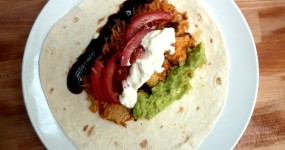 The quest for Mex part 2 – Feisty Chicken Burritos posted on December 21, 2010
The quest for Mex part 2 – Feisty Chicken Burritos posted on December 21, 2010  Cheat’s Dulce de Leche posted on January 7, 2011
Cheat’s Dulce de Leche posted on January 7, 2011  Why I write and four ace bloggers who do it better posted on July 25, 2014
Why I write and four ace bloggers who do it better posted on July 25, 2014  Rich Portuguese Custard posted on November 29, 2010
Rich Portuguese Custard posted on November 29, 2010 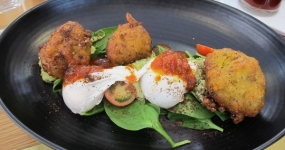 Lau’s Ultimate Corn Fritters and the four fritter truths posted on March 1, 2013
Lau’s Ultimate Corn Fritters and the four fritter truths posted on March 1, 2013
Disclaimer:
All opinions in this blog are mine, an everyday, real-life person. I do not accept payment for reviews and nor do I write sponsored posts. I do not endorse the content of the comments herein.


